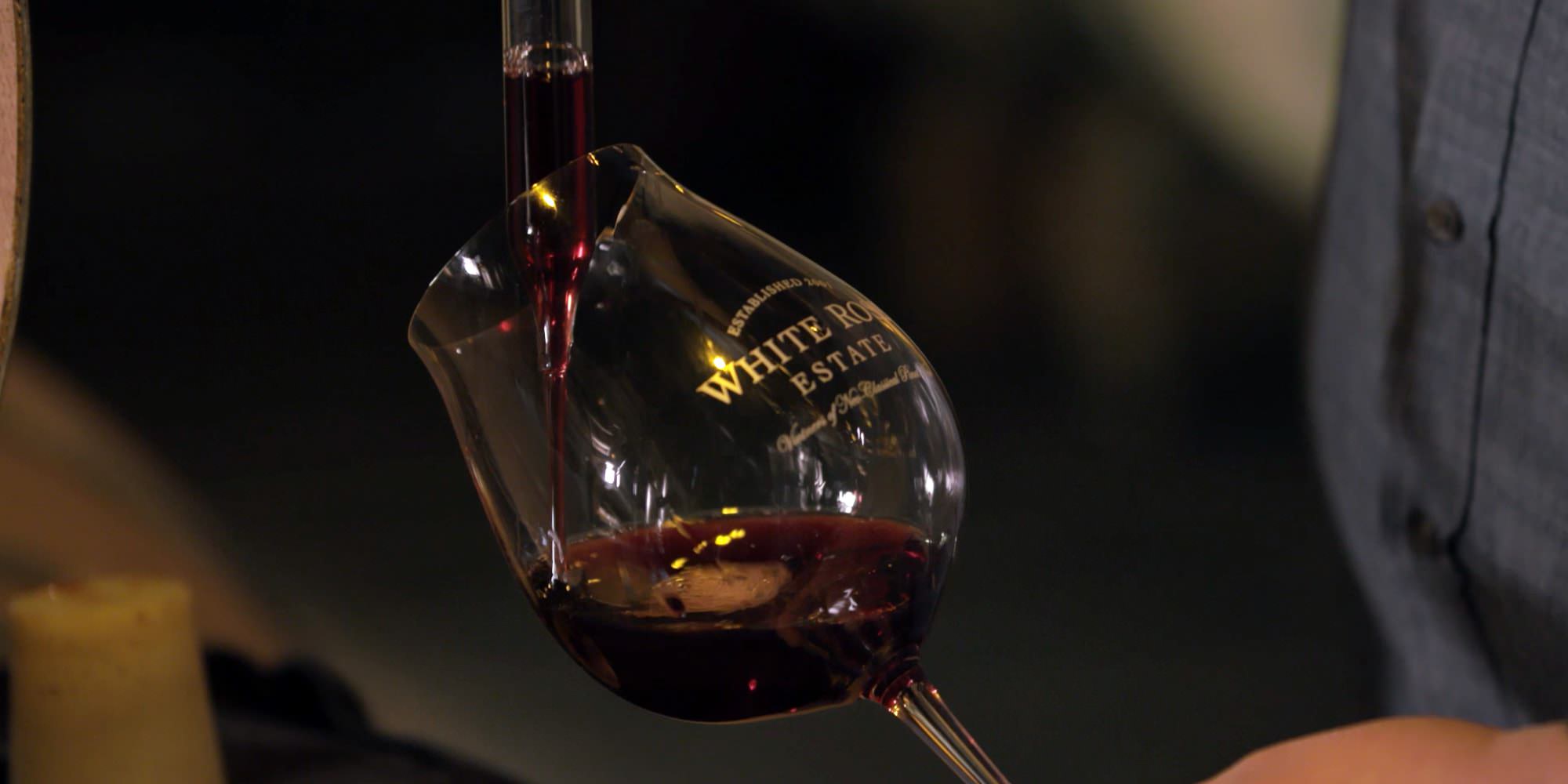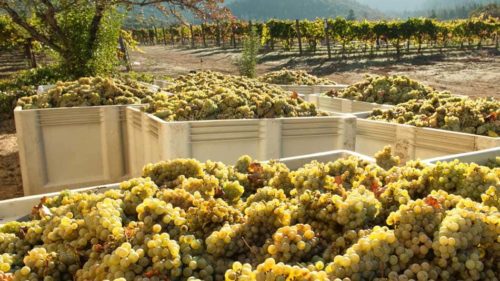In memory
Jesús Guillén passed away on November 6, 2018 after a battle with cancer. He was 37 years old. Guillén will be remembered as a trailblazer in Oregon’s wine industry. Guillén’s legacy is honored with Asociacion Hispana en la Industria Vinicola de Oregon (AHIVOY), an organization he conceived to empower Latinx vineyard workers and help them overcome socio-economic challenges to find career paths in the wine industry. In partnership with Chemeketa Community College, AHIVOY offers professional training curriculum that includes technical wine knowledge and English-immersion programs. Yuliana Cisneros-Guillén (Guillen Family Wines), Sofia Torres (Cramoisi Vineyard), Cristina Gonzales (Gonzales Wine Company) and Sam Parra (Parra Wine Co.) are among the AHIVOY board members.
The following profile was published in 2017.
As the morning sun rises, a soft glow sweeps across hillside vineyards at White Rose Estate in the heart of Oregon’s famed Dundee Hills wine region. Father and son walk side by side down a leafy row of 35-year-old pinot noir vines, the snowcapped peak of Mt. Hood shimmering in the distance.
“Oregon is one of the best places in the world to grow pinot noir,” says Jesús Guillén, as he plucks grape clusters to sample for ripeness and flavor. “The first wine I fell for was pinot, and that’s why I make wine here.” Like many Willamette Valley vintners, Guillén describes an epiphany he experienced when tasting pinot so transcendent that it altered his destiny.
But unlike many of his peers, Guillén has neither formal wine education nor grape-harvest stints around the globe. In fact, as one of the Oregon’s few Latinx vintners, his wine story stands out as one of a kind.
A Newfound Dream
A Mexican immigrant, Guillén came to the United States in 2002, after graduating with a computer engineering degree from Universidad Autónoma de Chihuahua. He was visiting his father (also named Jesús), who was working as the vineyard manager for White Rose in Dayton. The younger Guillén arrived with the intent to study English for six months at a nearby community college, then return to Mexico to work.
But when he saw Oregon, “everything changed,” he says. He began tasting at different wineries across the state, learning more about the industry with each sip. What captivated him most was how the smell and taste of some wines could so vividly stimulate all of his senses. “That moment when your senses peak, and you know you are tasting something unique and beautiful, it’s a magnificent sensation,” he says.
On one of his winery tours, he happened to taste two transformative pinots: the 1999 Archery Summit Arcus Estate pinot noir and the 1999 Adelsheim Elizabeth’s Reserve pinot noir. “Until those wines, I did not realize a beverage could give you such a sensorial experience,” he says. In that pivotal moment, he decided to stay in Oregon to pursue a winemaking career.
“My dream was to make wines like those,” he says — wines that through aroma and taste offer an emotional experience. “You smell the wine and you can imagine yourself walking in a forest surrounded by pine trees,” he says. “Pinot can do that for you.”
It was a leap of faith for Guillén, because he spoke limited English and knew little about winemaking. He began working in the vineyard for Patricia Green Cellars in 2002, eventually joining his father at White Rose, where he expressed to owner Greg Sanders an interest in furthering his wine knowledge. Soon he was assisting in the cellar, where he met consulting winemaker Mark Vlossak of St. Innocent Winery, a significant mentor for Guillén.
In his six-year stint working with Vlossak, he learned to approach winemaking in a scientific and analytical way. “He taught me all the fundamentals about wine from the chemistry and microbiology to sensory evaluation,” says Guillén. “We make different styles of wine,” he says, “but I use the foundation he provided me every day.”

Growing a Legacy
In the barrel room at White Rose, where aromas of toasted wood and ripe fruit fill the air, Guillén uses a glass “thief” to extract a sample of pinot noir and squirts the inky juice into his glass. He swirls, sniffs and sips — sidling from barrel to barrel to evaluate how each wine is developing, sometimes tasting from up to 40 casks a day.
“My style in general is based on enhancing complexity and harmony within a wine,” he says. “Complexity to me is layers of aromas in a wine. It could be floral, earthy tones; it could be spice; it could be fruit.” Guillén describes harmony as when all the elements of a wine play in unison. He pauses at the next barrel and adds: “It’s when everything is speaking on the same level.”
As he moves through the winery, the soft-spoken winemaker reveals his convivial nature, and a career trajectory that’s clearly fueled by grit and passion. With a naturally discerning palate and a proclivity for hard work, Guillén has quickly emerged as one of the industry’s rising stars.
He stepped into the role of cellar master for White Rose in 2004, just two years after moving to the United States. By 2008 he was promoted to head winemaker and soon after received two scores of 94-plus from Wine Advocate magazine for his first vintage. In his second year of winemaking, one of his wines achieved a 96 — at the time, one of Oregon’s all-time highest scores awarded by the esteemed wine publication.
“When I decided to become a winemaker, it seemed like an impossible goal,” Guillén says. But then the impossible happened. He remembers his early years, when he plied his contacts for a Latino mentor in the industry, but there weren’t any. “Now that I’m a winemaker, I try to help others new to the path as well,” he says.
“I look at the labor force in the vineyard, and 95 percent of the workers are Latino. But I don’t see a lot of Latino people in the wineries,” says Guillén. According to a report commissioned by the Oregon Health Authority in 2013, more than 90,000 Latino migrant and seasonal workers labor in Oregon’s agricultural industry annually. And while many of these Latinos tend to the state’s approximately 1,052 vineyards, transitioning to winery work is limited.
Fifteen-plus years since he started his wine career, Guillén sees an industry shifting. “There’s been a lot of outside investment in Oregon lately, and as more jobs open, I see more roles and opportunities for Latinos in the winery,” he says, “especially with the passing from generation to generation. The children from the first generation of vineyard workers are evolving into different roles now, from cellar masters to lab technicians.”
As he thinks of his own children and their future, Guillén has embraced his entrepreneurial spirit and launched his own small label, Guillén Family Wines. He began with salvaged fruit in 2006, producing 45 cases, and has since expanded to regularly sourcing pinot noir grapes from Vista Hills Vineyard, also located in the Dundee Hills. He’s scaled up production to around 1,000 cases annually. He names his pinot noir wines after family members, including Adrián for his son, Domingo for his grandfather, and Esteban and Damián for his nephews.
Guillén’s long-term vision for the future is to build his own winery and plant a vineyard. “I want this to be a business that I leave as a legacy to my family,” he says. “Hopefully, future generations in my family will grow grapes and make wine. That’s my dream.”

¡Salud!
In Spanish, salud is a toast that means “cheers” or “good health.” Here in Oregon, ¡Salud! is a movement led by Oregon winemakers and health care professionals to provide health care services for vineyard workers and their families.
Each year, during the second weekend in November, the industry holds a wine auction and gala to raise funds for health care services. The event raises an average of $700,000 annually — and since its founding in 1991, ¡Salud! has raised more than $13 million.
With this capital, the ¡Salud! health care team provides direct care to approximately 150 vineyards throughout the northern Willamette Valley using a mobile medical unit, and averages around 40 wellness clinics during the summer months.
“The auction is important because many vineyard workers are seasonal, so they don’t have access to health insurance,” says Guillén. “The money raised from this event funds programs that provide our workers with basic health care. But it doesn’t stop there: If a worker has a more serious problem, the health care staff works to find partner organizations and specialists at discounted rates so workers can afford treatment.”
For 2017, in addition to the Friday night auction hosted at Ponzi Vineyards, the weekend includes a Saturday dinner and auction gala at Domaine Serene. Both nights feature one-of-a-kind pinot noirs crafted exclusively for the auction.
– about the videographer –
Brian Kimmel
 Brian Kimmel is the producer and director of photography for Optic Nerve Productions. Based in Portland, Oregon his documentary and commercial work take him around the world to make images and films. Brian’s favorite assignments are the ones that keep him home in beautiful Oregon, including features on Bee Local, chef Justin Wills of Restaurant Beck and jazz musician Mel Brown.
Brian Kimmel is the producer and director of photography for Optic Nerve Productions. Based in Portland, Oregon his documentary and commercial work take him around the world to make images and films. Brian’s favorite assignments are the ones that keep him home in beautiful Oregon, including features on Bee Local, chef Justin Wills of Restaurant Beck and jazz musician Mel Brown.


